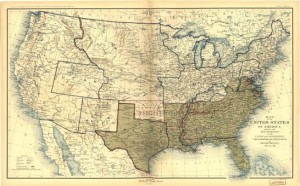 In addition to the advantage of manpower, the United States has at its disposal more financial resources and tools than does the Southern Confederacy. Today, the U.S. Congress enacts the Second Legal Tender Act, issuing $150,000,000 in paper currency not backed by gold or silver. The issuing of paper money grows dramatically as the war progresses, providing a way for the United States to finance the tremendous costs associated with the war.
In addition to the advantage of manpower, the United States has at its disposal more financial resources and tools than does the Southern Confederacy. Today, the U.S. Congress enacts the Second Legal Tender Act, issuing $150,000,000 in paper currency not backed by gold or silver. The issuing of paper money grows dramatically as the war progresses, providing a way for the United States to finance the tremendous costs associated with the war.
Yet all the money in the world cannot purchase effective military strategy. With the Union reeling from the failed Peninsula campaign against Richmond, U.S. President Abraham Lincoln continues his quest for an effective General-in-Chief by turning to Henry Halleck (1815-1872), who in his previous post in the Western theater had dealt harshly with a Baptist family, angering Baptists of the South. In the months ahead, Halleck’s administrative abilities are recognized, although his communication skills are faulted. At the same time, Ulysses S. Grant is given command of the armies of Tennessee and Mississippi in the Western theater.
Meanwhile, in the Confederate hospital at Camp Leesburg near Charleston, South Carolina, Lieutenant W. E. Phillips, Company F of the 16th South Carolina, quietly dies of a fever induced by illness. A graduate of Furman University and a student at the Southern Baptist Theological Seminary, Phillips, like many of his fellow students, had left seminary following the outbreak of war to serve in the Confederate Army. And like many young men of the South, Phillips’ patriotism is rewarded with an early death.
Unfortunately, the South has a limited supply of young men for military service. During the decade of the 1850s a mass exodus of white males from the South took place in reaction to limited work opportunities in a region where wealthy landowners preferred the forced labor of African slaves to the hiring of white laborers. The lack of white manpower will ultimately comes to haunt a nation built upon white supremacy.
Sources: “United States Note” (link); Henry Halleck Biography (link); 16th South Carolina, Battle of Franklin (link)


